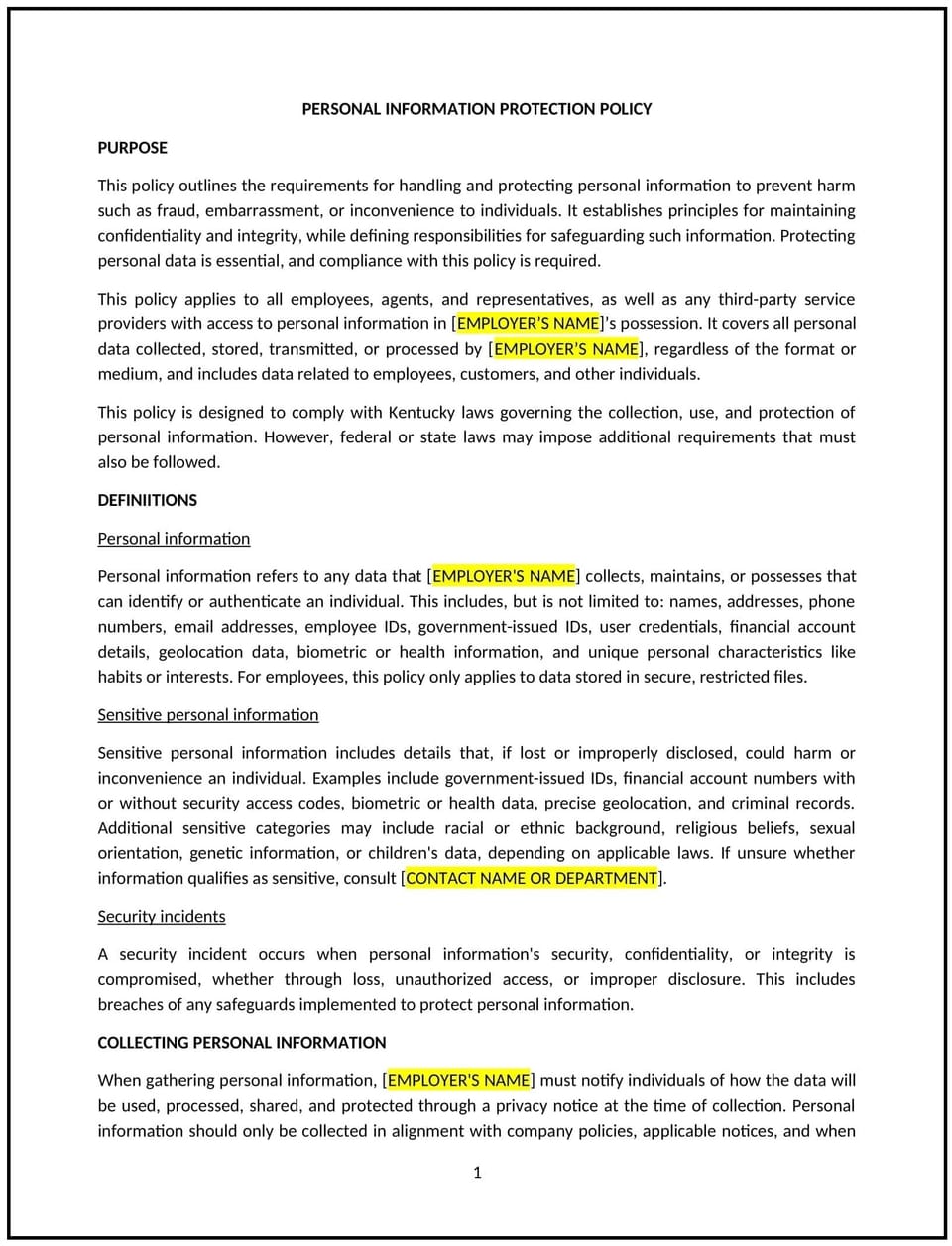Personal information protection policy (Kentucky): Free template

Personal information protection policy (Kentucky)
A personal information protection policy outlines the steps Kentucky businesses take to safeguard sensitive employee, customer, and business data. This policy establishes guidelines for collecting, storing, and handling personal information to minimize risks and uphold trust.
By adopting this policy, businesses can enhance data security, maintain confidentiality, and demonstrate a commitment to responsible information management.
How to use this personal information protection policy (Kentucky)
- Define personal information: Clearly outline what constitutes personal information, such as names, addresses, Social Security numbers, financial details, or health records.
- Establish data handling procedures: Provide guidelines for collecting, storing, and processing personal information, ensuring it is only accessed by authorized personnel.
- Implement security measures: Specify the technical and administrative safeguards, such as encryption, access controls, and secure storage, to protect personal information.
- Address third-party access: Define the circumstances under which personal information can be shared with third parties and outline the steps for ensuring their compliance with data protection standards.
- Include breach response protocols: Outline procedures for identifying, reporting, and responding to data breaches to minimize harm and notify affected parties promptly.
- Ensure data minimization: Emphasize collecting only the information necessary for business operations and securely disposing of data that is no longer needed.
- Provide training: Train employees on best practices for handling personal information to reduce risks of accidental or intentional data misuse.
Benefits of using this personal information protection policy (Kentucky)
This policy provides several key benefits for Kentucky businesses:
- Enhances data security: Reduces the risk of unauthorized access, breaches, or misuse of personal information.
- Builds trust: Demonstrates a commitment to protecting sensitive information, strengthening relationships with employees, customers, and partners.
- Promotes accountability: Establishes clear roles and responsibilities for managing and safeguarding personal information.
- Mitigates risks: Helps prevent financial and reputational damage associated with data breaches or compliance violations.
- Aligns with best practices: Encourages responsible data management consistent with industry standards and Kentucky regulations.
Tips for using this personal information protection policy (Kentucky)
- Communicate the policy: Ensure employees and other stakeholders understand the policy and their responsibilities through training and documentation.
- Regularly audit systems: Conduct periodic reviews of data storage, access, and security practices to identify vulnerabilities and implement improvements.
- Monitor third-party compliance: Verify that vendors and partners handling personal information meet the business’s data protection standards.
- Update security measures: Stay informed about emerging data security technologies and integrate them into the business’s practices.
- Review periodically: Revise the policy as needed to reflect changes in Kentucky laws, business operations, or data protection best practices.
Q: What is considered personal information under this policy?
A: Personal information includes details such as names, contact information, Social Security numbers, financial data, and health records.
Q: How should businesses store personal information securely?
A: Businesses can use encryption, access controls, secure storage systems, and regular backups to protect sensitive information.
Q: Can personal information be shared with third parties?
A: Personal information may be shared with third parties only when necessary and under strict agreements ensuring they adhere to data protection standards.
Q: What steps should businesses take in the event of a data breach?
A: Businesses should follow their breach response protocol, which includes identifying the breach, notifying affected parties, and taking corrective action to prevent recurrence.
Q: How often should employees receive training on data protection?
A: Regular training, at least annually or when policy updates occur, helps ensure employees are informed about best practices and responsibilities.
Q: What is data minimization, and why is it important?
A: Data minimization involves collecting only the necessary information and securely disposing of data that is no longer needed to reduce risks and improve security.
Q: How often should the personal information protection policy be reviewed?
A: The policy should be reviewed periodically to ensure alignment with evolving laws, technologies, and business needs.
Q: What tools can businesses use to protect personal information?
A: Businesses can implement tools like firewalls, encryption software, secure cloud storage, and access management systems to safeguard data.
This article contains general legal information and does not contain legal advice. Cobrief is not a law firm or a substitute for an attorney or law firm. The law is complex and changes often. For legal advice, please ask a lawyer.


